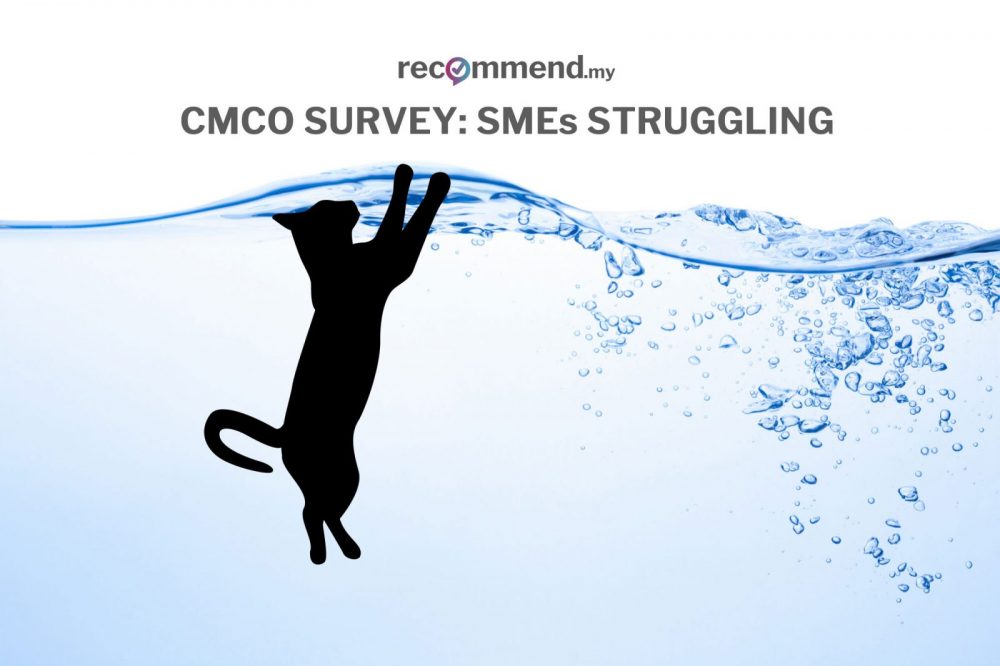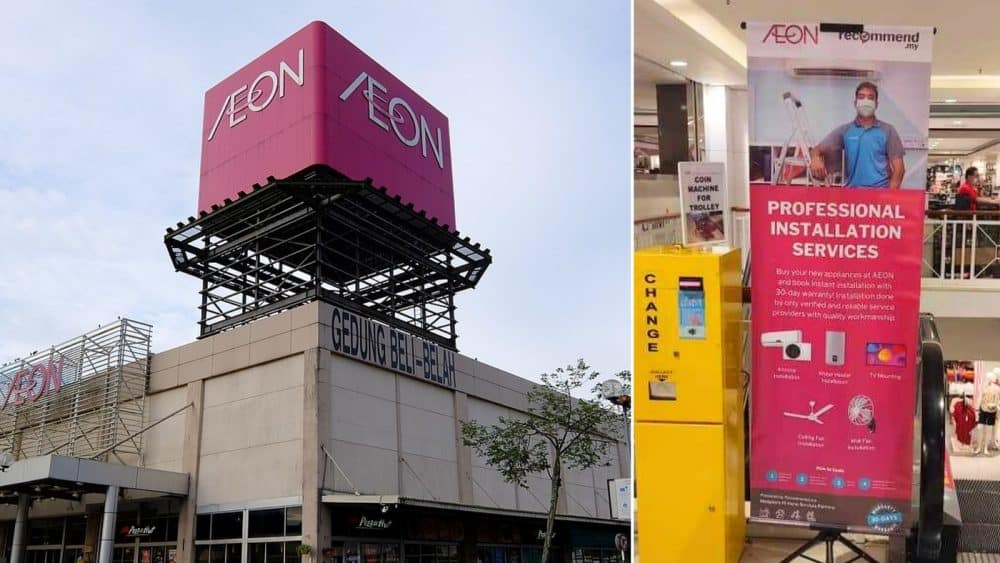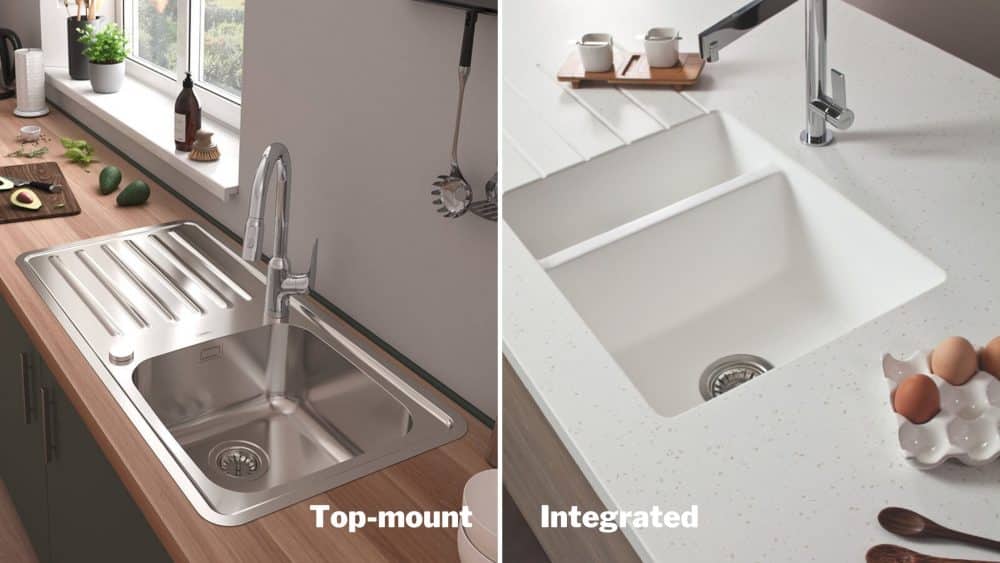Nine weeks of the Movement Control Order (MCO) has left a major dent in revenue for small businesses and SMEs. And three weeks into the more-relaxed CMCO, we wanted to know; are SMEs doing better now?
Table of Contents
Background
When the MCO first began on 18 March 2020, we surveyed our SMEs and found that 68.9% of SMEs saw a 50% drop in business once MCO started.
According to a statement by Prime Minister Tan Sri Muhyiddin Yassin, “the government lost RM2.4 billion daily during the MCO, with a rough estimation of RM63 billion in total”. In addition, the SME Association of Malaysia president, Datuk Micheal Kang added that if the MCO continues, over one million employees in the SME industry are at risk of losing their jobs.
From MCO to CMCO
On 4 May 2020, the Malaysian government transitioned to the Conditional Movement Control Order (CMCO) with loosened regulations, so that most businesses could reopen to promote the recovery of the economy. However, they were subject to strict compliance with the Ministry of Health’s standard operating procedure (SOP).
Three weeks into the CMCO, we wanted to know whether service-based SMEs have decided to reopen or stay closed; the reason for their decision; and their main challenges during this period.
Survey Highlights
- 64% of businesses decided to re-open in CMCO, with the remaining 36% deciding to remain closed
- From the businesses that decided to reopen, 62.1% are from the home improvement and home maintenance sector. However, they continue to face challenges that include financial struggles (60.3%)
- From the businesses that decided to stay closed, almost half (48.5%) were from the events and weddings industries. The reasons cited include customer’s unwillingness to order, delays and cancellations (66.7%)
- From both groups of businesses, one theme that surfaced are uncertain customer demand, and the uncertainties created from the strict, variable and flip-flopping of government policies, making it difficult for them to plan their re-opening and comeback
Did SMEs open or close during CMCO?
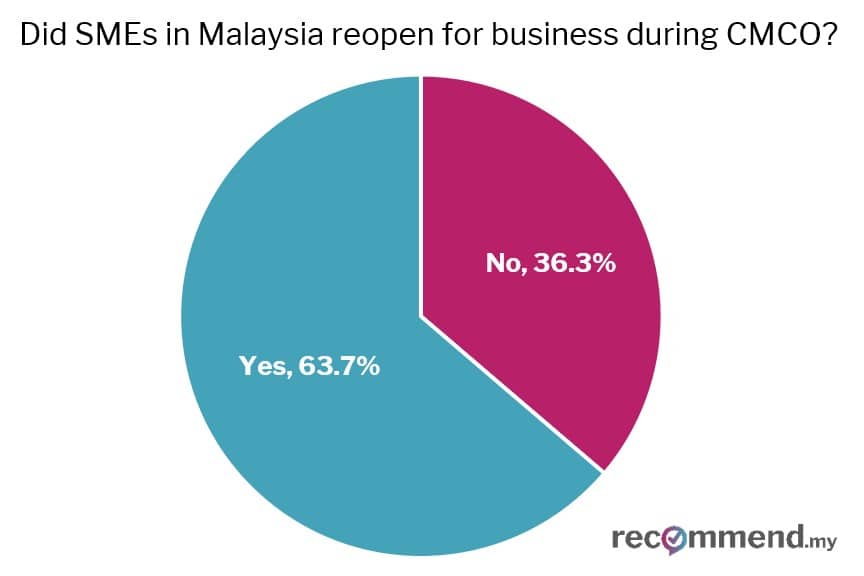
Two weeks into the CMCO that began on 4 May 2020, 63.7% of SMEs surveyed have reopened for business, and 36.3% have not.
Industries that chose to OPEN during CMCO
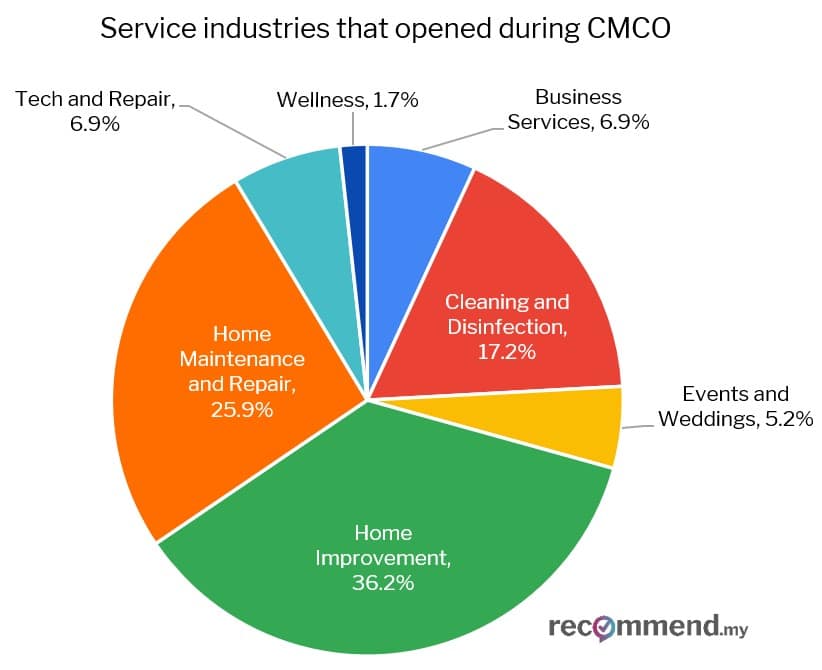
Of the companies that decided to reopen, 62.1% are in the home improvement and home maintenance industries. 17.2% were cleaning and disinfection services, followed by tech and repair services (6.9%) and business services (6.9%). Wellness services made up just 1.7% of respondents who decided to reopen.
Even during the MCO, home service businesses remained partially operational to serve essential industries and urgent needs. This included services like plumbing works, electrical works and appliance repairs.
Once MCO transitioned to CMCO, home services such as renovations were now allowed, so there was less ambiguity on whether contractors would be stopped at police roadblocks. The survey results suggest that many home service companies felt confident to resume operations.
Open during CMCO: Challenges faced by companies
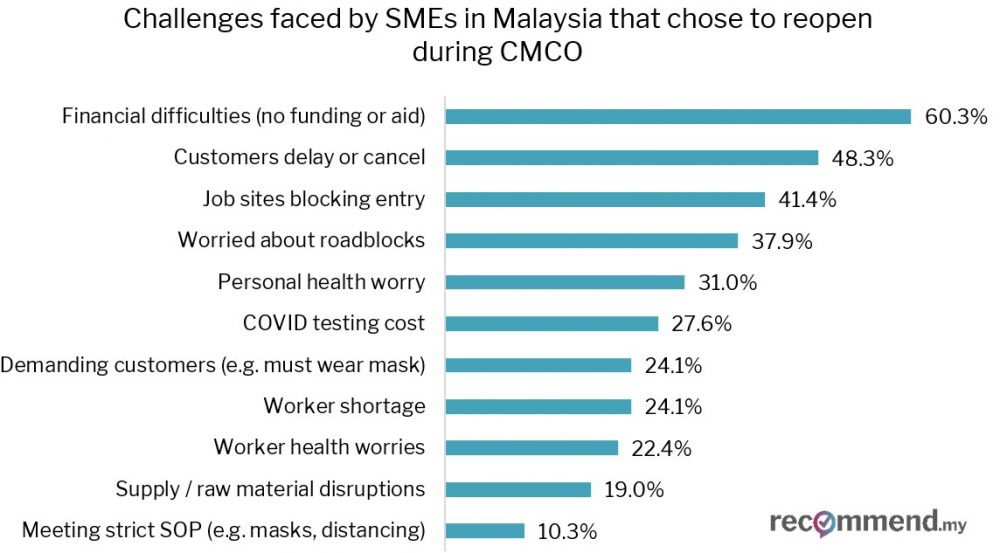
Companies that decided to reopen during CMCO are facing new challenges.
Greatest challenge: Finance
The majority of SMEs reported facing financial difficulties (60.3%) while operating during CMCO, and 48.3% experienced customer delays or cancellations, reducing their potential revenue.
Next: Inability to complete existing jobs
41.4% also reported that job sites were blocking entry. These are mainly condominiums or gated neighbourhoods. This meant condo and neighbourhood security guardhouses were specifically instructed by their management committees to deny access to workers, even though the government allows home services to run. This forces workers to turn back, having wasted their travel time.
At the same time, the businesses themselves felt worried about getting stopped at roadblocks (37.9%), even though it has been reported that roadblocks would no longer be in place during CMCO.
Concerns about infection
The other problems faced by the SME companies include the employer’s personal health worries of contracting any potential infection (31%). Another challenge was the financial strain of COVID-19 testing (27.6%) for unregistered foreign workers that do not contribute to SOCSO.
Manpower and supply
Some of them experienced worker shortage (24.1%), as some of them may have gone back to their villages during MCO. Foreign or migrant workers have also returned to their home countries or were impacted by the round-ups by the authorities for mass testing.
Some are even worried about their workers’ health on the job (22.4%).
A small number of SMEs found that even though their teams were ready to work, the supply chains were disrupted during MCO took some time to recover (19%).
Lowest worry: Meeting SOPs
Out of all the businesses that reopened, only 10.3% said they found it hard to comply with the strict SOPs such as providing face masks and hand sanitizers to their workers, and regular temperature checks. Even with the long list of procedures that they are required to follow, it does not appear to be their greatest worry during CMCO.
Other reasons
Respondents also offered anecdotal challenges they were faced with during CMCO:
- “Competition is even tougher now”
- “Customers are demanding for more discounts because they know contractors are desperate to get jobs. It’s a dangerous situation because contractors who agree to the discounts may face financial difficulty in the middle of the project”
Service industries that chose NOT to open during CMCO
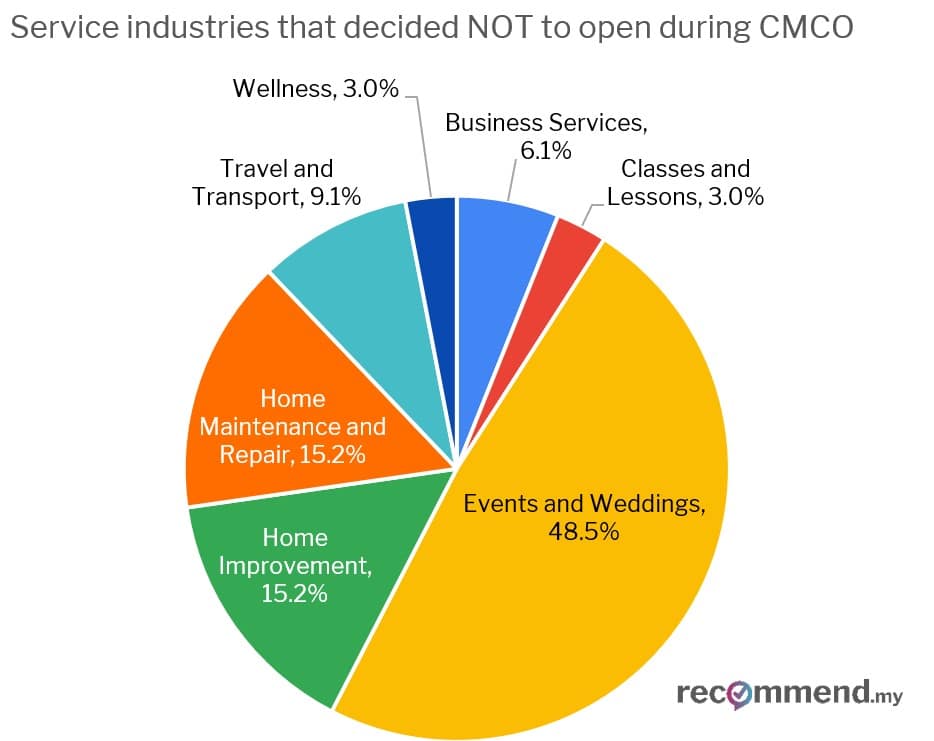
Based on our survey data, 36% of businesses chose NOT to resume operations during CMCO and preferred to remain closed.
Of these, the majority of respondents that chose not to reopen come from the events and weddings industry (48.5%). Survey respondents in this industry included team-building event specialists, photographers, makeup artists and more. This is not surprising, as events and gatherings remain on the list of prohibited activities during the MCO and CMCO.
30.2% of businesses that chose not to reopen came from the home improvement and home maintenance and repair sectors. This was followed by travel and transportation (9.1%), business services (6.1%), wellness services (3%), and classes and lessons (3%).
Not Open During CMCO: Reasons
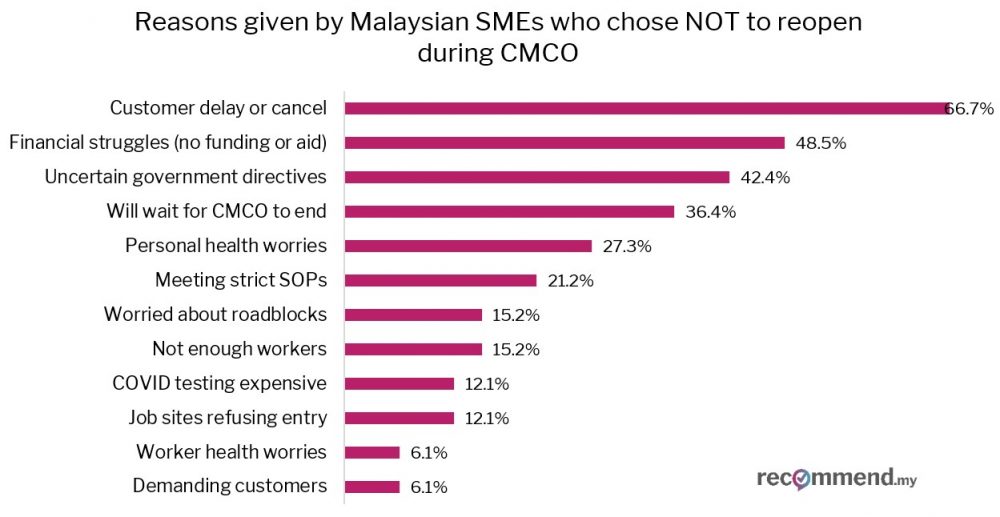
Greatest challenge: Finances
The biggest reason given for not reopening was that customers had delayed or cancelled their jobs (66.7%) during this pandemic. With customers hesitant to begin new jobs, and delaying or cancelling existing ones, the companies could not foresee any potential for income, thus have decided to remain closed to keep costs low.
48.5% of respondents who remained closed also reported financial struggles from the business disruption caused in the past 2 months.
Next: Uncertainty
42.4% of participants also opted to remain closed citing unclear (or flip-flopping) government directives. 36.4% stated that they would rather wait out the CMCO and reopen only once there is clarity on the government policies and the SOPs have settled.
Fear
Some companies cited personal health worries (27.3%) because they didn’t want to contract COVID-19, and were simply not ready to deploy teams to work.
Others claimed (21.2%) that due to the inability of meeting the strict SOPs set by the government (e.g providing face masks and sanitizers to workers, temperature checks, etc) led them to remain closed.
15.2% expressed that they were worried about getting stopped at police roadblocks, despite there being none during CMCO. Others (15.2%) stated they do not have enough workers to operate, suggesting that they may have returned to their hometowns or home countries before the MCO started.
12.1% said they were unable to afford COVID-19 testing for foreign workers thus will stay closed altogether. Another small fraction (12.1%) stated that they were not permitted to enter job sites (e.g condominiums, residential area, etc) and were turned away by security guards.
The least of the respondents (6.1%) were worried about their workers’ health thus refusing to take the risk, and the rest (6.1%) could not meet the demands of customers like proving their negative COVID-19 test.
Conclusions
The survey results show that SMEs that reopened during CMCO are facing mainly financial challenges, and government aid for SMEs has perhaps not reached those that are truly in need.
It was also clear that customers are still being conservative about ordering services that are not urgently needed, and this has caused hesitation from service providers about coming back in full force. Stronger communication about safety standards can perhaps help customers feel more comfortable that the risks of hiring service vendors can be kept low and manageable.
The conservative stance of strata residence managers has made business processes more complicated for service vendors. Although customers living in strata residences have been advised to obtain permission from their management offices, more communication between property managers and their residents is key to ensure that vendors can service customers in need
It is also clear that better communication and clear policies between the government agencies (e.g. MKN, MoHR, MoH) and those in law enforcement (e.g. police managing roadblocks) could have and will continue to help businesses plan properly and return to operations. Even though the MCO and CMCO period when urgent home services were allowed and service vendors had the proper authorisation letters, there were reports of service vendors stopped at roadblocks and questioned, which caused them to be delayed.
If these issues remain, the Malaysian economy could suffer heavily in losses as SMEs contribute to 38.3% of our gross domestic product (GDP) which amounts to over RM500 billion.
About this survey
This survey was conducted among 89 service-based, small-to-medium sized enterprises (SMEs) in Malaysia on 14 May 2020 during the Conditional Movement Control Order.
About Recommend.my
Recommend.my is Malaysia’s leading Home Services platform, established in 2014. Thousands of service professionals use our platform to receive bookings and quotation requests for jobs including cleaning, disinfection, plumbing, electrical, aircon servicing, renovations, handyman services, interior design and more. To date, the service professionals on our platform have served hundreds of thousands of customers, homeowners, and businesses in Malaysia.
Contact our PR division at [email protected]
This survey article first appeared in Recommend.my as CMCO Survey: Malaysian SMEs Struggling to Keep Head Above Water


